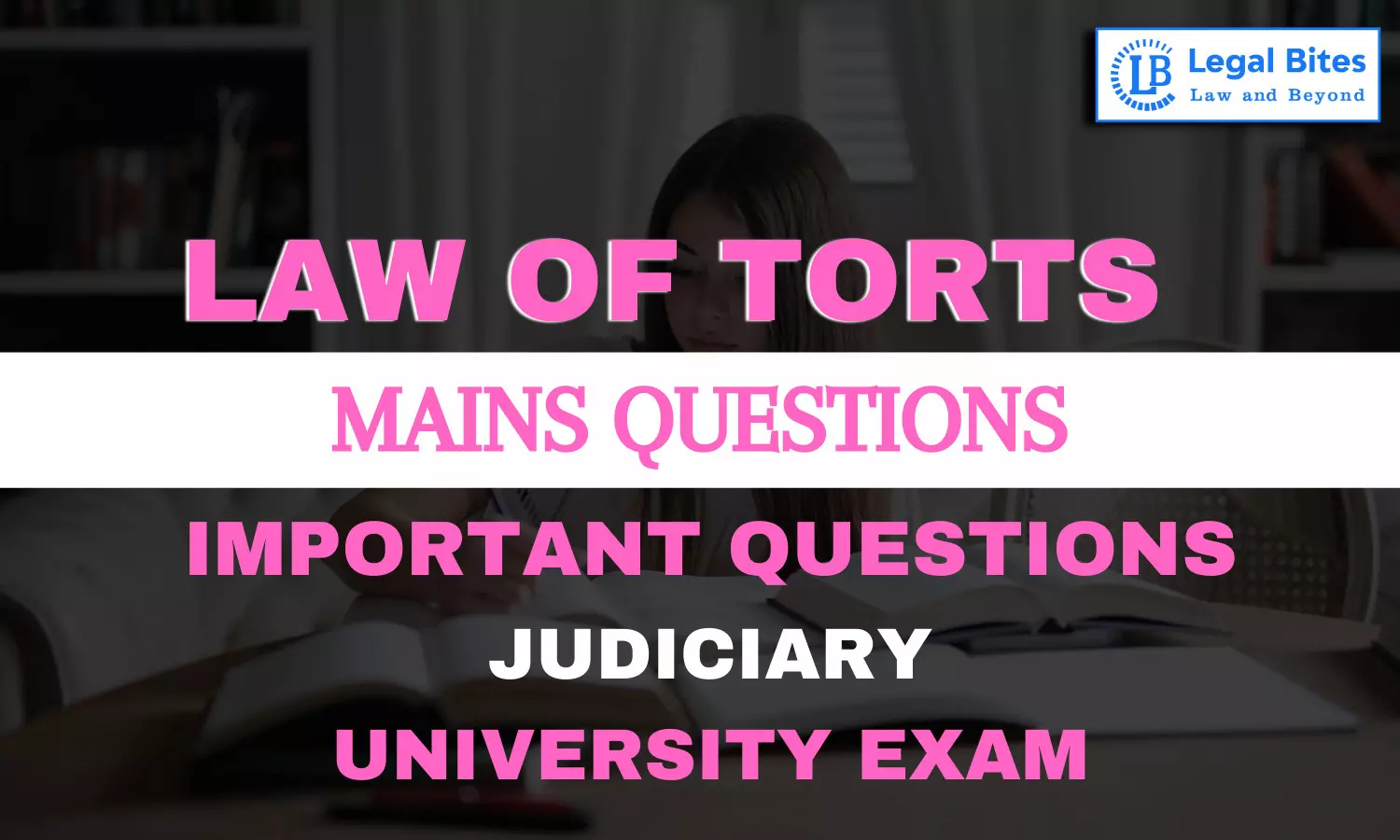There is a distinction between Tort and Crime, but there are various wrongs which find place both under Criminal Law and Law of Torts. Comment.
Find the question and answer of Law of Torts only on Legal Bites.

Question: There is a distinction between Tort and Crime, but there are various wrongs which find place both under Criminal Law and Law of Torts. Comment. [DJS 2011]Find the question and answer of Law of Torts only on Legal Bites. [There is a distinction between Tort and Crime, but there are various wrongs which find place both under Criminal Law and Law of Torts. Comment.]AnswerThe sentence is accurate and provides a general overview of the relationship between tort law and criminal law....
Question: There is a distinction between Tort and Crime, but there are various wrongs which find place both under Criminal Law and Law of Torts. Comment. [DJS 2011]
Find the question and answer of Law of Torts only on Legal Bites. [There is a distinction between Tort and Crime, but there are various wrongs which find place both under Criminal Law and Law of Torts. Comment.]
Answer
The sentence is accurate and provides a general overview of the relationship between tort law and criminal law. Tort law and criminal law are two distinct legal systems that address different types of wrongs or harms, but there are some instances where the same actions may give rise to both a tort claim and a criminal charge.
A tort is a civil wrong that occurs when an individual suffers harm or injury as a result of the actions of another person. Tort law is designed to compensate individuals for the harm they have suffered and to deter others from engaging in similar conduct. Tort claims may include personal injury, property damage, or other types of harm, and may result in an award of monetary damages to the injured party.
Criminal law, on the other hand, is a system of laws that criminalizes certain types of conduct and punishes individuals who engage in those actions. Criminal law is designed to protect society and maintain social order, and criminal charges may result in fines, imprisonment, or other forms of punishment.
However, there are some instances where the same actions may give rise to both a tort claim and a criminal charge. For example, if an individual causes a car accident while driving under the influence of alcohol, they may be liable for both a tort claim for personal injury or property damage and a criminal charge for driving under the influence.
The distinction between tort law and criminal law is important because the two systems have different goals, procedures, and remedies. Tort claims are resolved through civil court proceedings, and the standard of proof is lower than in criminal cases. Criminal cases, on the other hand, are resolved through the criminal justice system, and the standard of proof is higher, requiring evidence beyond a reasonable doubt.
Here are the main differences between a Crime and a Tort:
Definition: A crime is a violation of criminal law that is punishable by the state, while a tort is a civil wrong that results in harm to an individual or property.
Purpose: The primary purpose of criminal law is to punish individuals for violating the law and to maintain social order, while the primary purpose of tort law is to compensate individuals for the harm they have suffered and to deter others from engaging in similar conduct.
Standard of Proof: In criminal cases, the standard of proof is higher, requiring evidence beyond a reasonable doubt. In tort cases, the standard of proof is lower, requiring a preponderance of the evidence.
Remedies: Criminal cases may result in fines, imprisonment, or other forms of punishment, while tort cases may result in an award of monetary damages to the injured party.
Proceedings: Criminal cases are resolved through the criminal justice system, while tort cases are resolved through civil court proceedings.
Relationship between the parties: In a criminal case, the state brings charges against the defendant, while in a tort case, the injured party brings a claim against the defendant.
Mental State: In criminal cases, the defendant's mental state, such as intent or recklessness, is often a crucial factor in determining guilt. In tort cases, the defendant's mental state is not as important as their conduct and the resulting harm.
Constitutional Protections: Criminal cases often involve more extensive constitutional protections, such as the right to a fair trial, the right to counsel, and the protection against self-incrimination, compared to tort cases.
While there may be some overlap between crimes and torts, they are two distinct legal concepts with different purposes, procedures, and remedies. While there is a distinction between tort law and criminal law, it is important to recognize that there are some instances where the same actions may give rise to both a tort claim and a criminal charge. Understanding the distinction between these two legal systems and the circumstances under which they may overlap is crucial for navigating the complex legal landscape.

Mayank Shekhar
Mayank is an alumnus of the prestigious Faculty of Law, Delhi University. Under his leadership, Legal Bites has been researching and developing resources through blogging, educational resources, competitions, and seminars.
